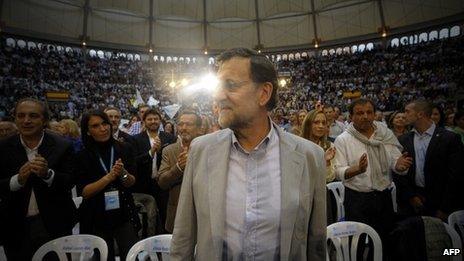Rajoy hopes for home advantage in Galicia elections
- Published

Elections in the Spanish region of Galicia on Sunday will be a key test for Prime Minister Mariano Rajoy, who has had a mixed start to his leadership of the country at the centre of the eurozone crisis.
Victory for his centre-right Popular Party (PP) in his home region of Galicia would normally be a formality, but throughout the financial crisis voters have consistently punished governments following the path of tough austerity.
Journalist and commentator for Galicia's most-read newspaper Voz de Galicia, Miguel Murado, describes this as "the first real test" for Mr Rajoy's economic policies.
"This election comes at a moment in which the debate is very much on the street as to whether those austerity measures are working or not, and how much they are damaging the social fabric [of Spain]."
'Disappointed'
At Galicia's and Spain's largest seafood market in the city of La Coruña, tonnes of seafood are sold at a series of auctions, which start most days at 0600.
While moving plastic crates of fish, Maria Vazquez Martinez complains that austerity measures and cuts to health and education are only making matters worse.
"I am very disappointed with Mariano Rajoy as he hasn't done what he promised he would," she says.
"He is not helping us, he is just strangling us."
However 32-year-old fish auctioneer Miguel Barcia said that he would be voting for the PP.
"They are the ones who offer us the most hope for the future."
'Just cutting'
Maria Jose Gomez, 36, lives in O Pino, a small village on the edge of Santiago de Compostela. She is unemployed and has a two-year-old son, Enoch.
"Young people like me were sold a beautiful dream," she says.
"You went to the bank to borrow money for a house, and they lent you the money for a car too."
Ms Gomez relies on her unemployment benefit, so that she can pay her mortgage. Once her state entitlement runs out after two years of being without work she doesn't know how she will be able to afford her mortgage.
Ms Gomez, who describes herself as someone with "conservative values", was a member of the PP in Spain and the deputy mayor for her local area.
However she will not be voting for them in these Galician regional elections.
"As well as a policy of austerity, they [the Spanish government] need to provide incentives for companies to create jobs," she argues.
"They are just cutting, without providing any solutions."
'Mysterious Mariano'
Mr Rajoy has given very few interviews since he became prime minister of Spain. He is a leader who does not seem at ease in front of the television cameras.
The Economist recently referred to the Spanish leader as "Mysterious Mariano", a reference to what the magazine said was his indecisiveness and his "prevarication" over whether to request a second financial rescue deal from the eurozone.
According to Murado of Voz de Galicia, there is the same perception in Spain because "the prime minister is seen as improvising every day".
"He is famous for standing idle and waiting for things to happen," claims Murado.
He believes that this strategy has worked well for Mr Rajoy within his own party.
"It remains to be seen whether this strategy will work in the turmoil of the financial crisis," he added.
It is an accusation, which senior members of Mr Rajoy's party strongly reject.
Jose Manuel Barreiro is spokesman for the PP in the Spanish Senate and knows the prime minister well.
Mr Barreiro describes Mr Rajoy as "prudent" and "very determined".
"The country does not need big headlines. However, Mariano is a man capable of taking big decisions, to get Spain out of the crisis."
Rescue deal
The PP has an absolute majority in the Galician parliament under regional president Alberto Nunez Feijoo, something that they are hoping to retain.
And the latest polls suggest they will.
As Monica Seoane Diaz from Galician-based Spanish School of Finance argues that the region has a large proportion of pensioners and a very conservative population.
What is more, she says the PP-led regional government has tried to "smooth down" the austerity measures of Spain's central government.
"A programme by which government subsidies were given to young people to help them buy their first house was left in place in Galicia much longer than it was in the rest of Spain."
Murado believes the conservative tendency of the region will make it difficult for the Spanish left to win votes.
However, he says if the left succeeds then "the message will be huge".
"It will mean that in the rest of Spain the political capital of the government has been eroded substantially," he says.
Mr Rajoy was keen not to ask for another rescue deal from the eurozone before these elections, fearing it could lose his party votes.
But whatever the result, once they are out of the way a second Spanish bailout request is likely to come soon.
- Published14 September 2012
- Published19 October 2012
- Published10 February 2012
- Published2 August 2012